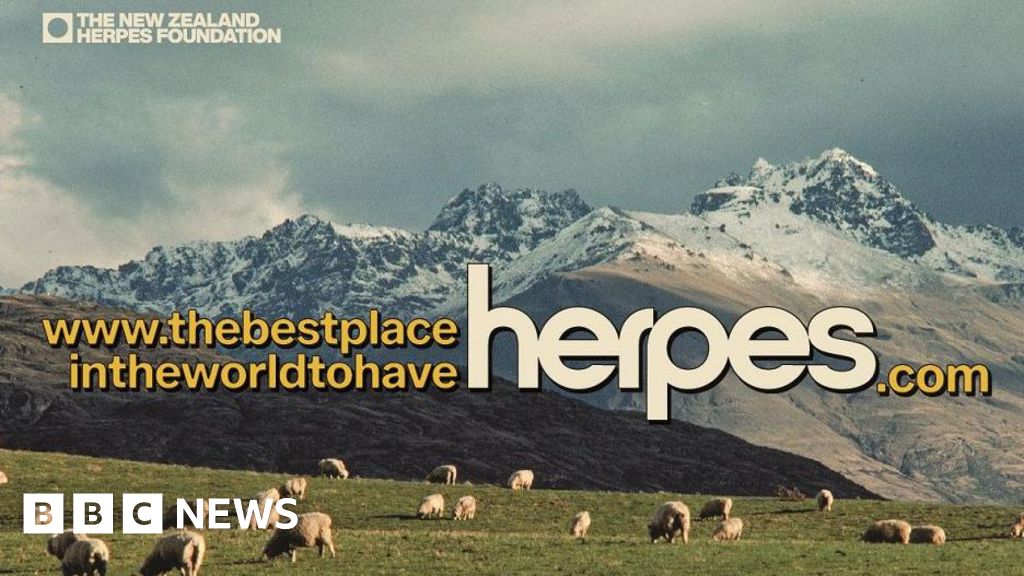"To fix our national pride, the solution is obvious: herpes." That was the pitch made by the charity New Zealand Herpes Foundation last October, when it launched a campaign to make the country the "best place" to have the infection. That campaign has been a roaring success, winning a top prize at this year's Cannes Lions awards, which recognise excellence in the creative industry. The campaign, which aimed to destigmatise herpes via a faux tourism advertisement video, was awarded the Grand Prix for Good - a category that seeks to highlight work by non-profit organisations and charities. The video starred Sir Graham Henry, the former head coach of the national rugby union team. In it, he touted the past successes of New Zealand and lamented its diminishing sources of national pride - such as an "embarrassingly low" sheep-to-human ratio and pies that are "pushing seven bucks". "We need something new to be proud of; something big and brave to put us back on the map," Mr Henry said as he scrawled the word "HERPES" - in all caps - on a chalk board. "It's time for New Zealand to become the best place in the world to have herpes." What followed was another old-school video packaged as a "herpes destigmatisation course", featuring other national icons like former health ministry chief Sir Ashley Bloomfield and professional boxer Mea Motu. The irreverent humour running through the campaign - which was developed with agencies Motion Sickness and FINCH - has struck a chord with audiences. "Forget doom and gloom, there's enough of that already to go around," said David Ohana, communications chief at the United Nations Foundation and a jury president at this year's Cannes Lions. "Our 2025 awardee took a taboo topic and turned it on its head – showing that with a great strategy, a big, bold, crazy idea … and humour for days, that anything is possible." Around one in three sexually active adults in New Zealand has the virus that causes genital herpes, though most have mild or no symptoms and can lead ordinary lives, according to the New Zealand Herpes Foundation. "Popular media, misinformation, and New Zealanders' awkwardness talking about sex - has led to huge stigmatisation for those living normal lives with the virus," reads a press release from when the campaign was launched last October. Alaina Luxmoore, from the New Zealand Herpes Foundation, told local TV programme Breakfast that millions had seen the campaign, which had "massive cut-through". "The campaign was so funny, I think that's why it worked," Luxmore said.
'Best place to have herpes': New Zealand ad wins top prize
TruthLens AI Suggested Headline:
"New Zealand Herpes Foundation's Campaign Wins Grand Prix at Cannes Lions"
TruthLens AI Summary
The New Zealand Herpes Foundation launched a bold campaign last October with the slogan, "To fix our national pride, the solution is obvious: herpes." This initiative aimed to destigmatize the herpes virus through a faux tourism advertisement, cleverly presented as a humorous call to embrace the condition. The campaign featured prominent figures, including Sir Graham Henry, the former head coach of the national rugby team, who highlighted the need for New Zealand to cultivate new sources of national pride. In a memorable moment, Henry scribbled the word "HERPES" on a chalkboard, advocating for the country to become the best place in the world to have the virus. The campaign's unique approach resonated with audiences, ultimately leading it to win the Grand Prix for Good at the prestigious Cannes Lions awards, recognizing outstanding work by non-profit organizations.
The campaign's success can be attributed to its irreverent humor and strategic messaging, which effectively addressed a taboo subject. With approximately one in three sexually active adults in New Zealand carrying the virus that causes genital herpes, the foundation aimed to combat the stigma surrounding it. Misinformation and societal discomfort regarding discussions about sexual health have contributed to this stigma, making the campaign's humorous angle particularly impactful. Alaina Luxmoore from the New Zealand Herpes Foundation reported that the campaign reached millions and was well-received for its comedic take on a serious topic. David Ohana, communications chief at the United Nations Foundation, praised the initiative for transforming a difficult subject into a conversation starter, emphasizing the potential for creativity and humor in addressing public health issues. The campaign illustrates how innovative thinking can challenge societal norms and foster acceptance for individuals living with herpes in New Zealand.
TruthLens AI Analysis
You need to be a member to generate the AI analysis for this article.
Log In to Generate AnalysisNot a member yet? Register for free.
